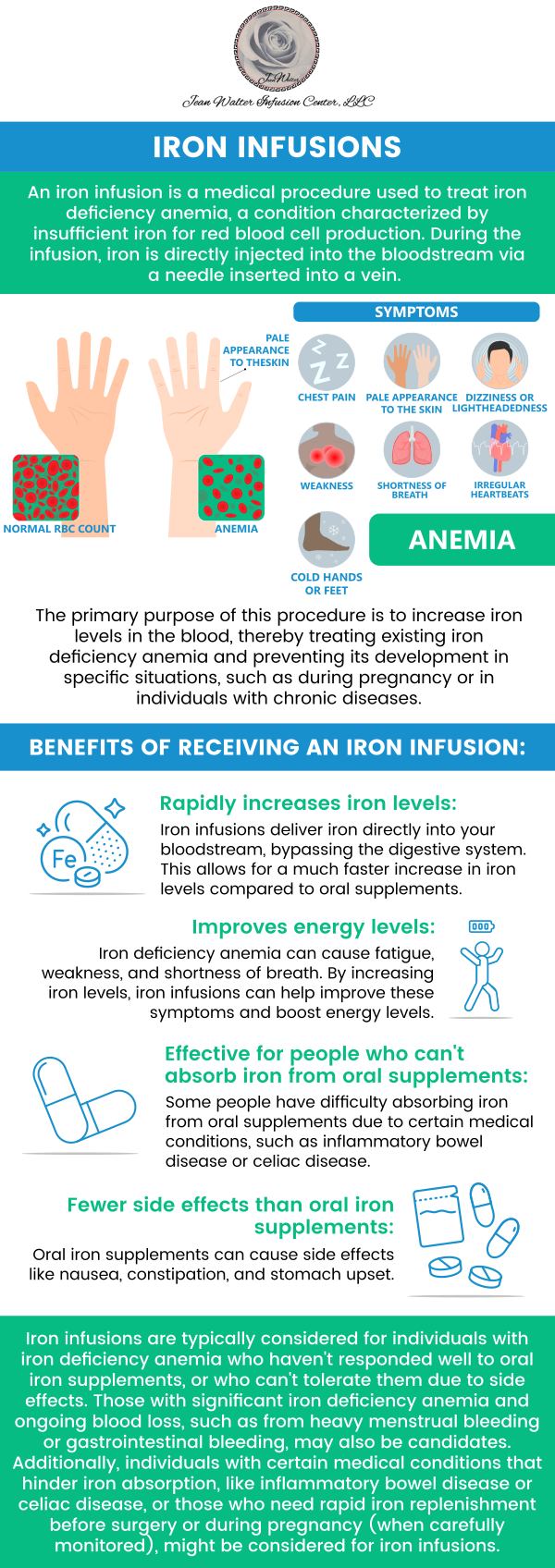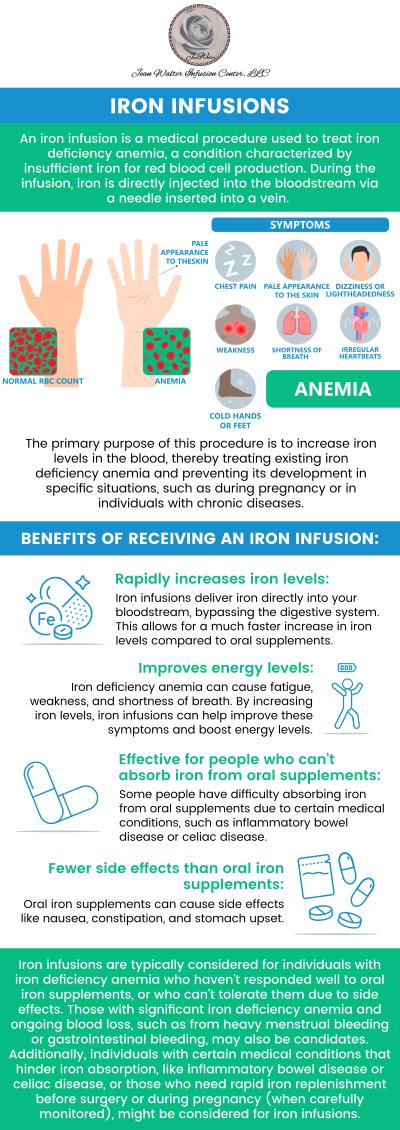How Do You Feel after an Iron Infusion?
When your levels of iron are too low, you’re susceptible to iron deficiency anemia, which results in a low amount of red blood cells. Iron infusions fix iron levels quickly and efficiently, and some patients experience improved symptoms within a week. If you have medically low iron levels and would like more information about iron infusion therapy to address this issue, connect with us or book online to schedule an appointment at your earliest convenience. Dr. Nasser Nasseri, MD, and his compassionate team are available at Jean Walter Infusion Center to help improve your condition. We have convenient locations to serve you in Edgewater, Rosedale, Columbia, Glen Burnie, North Baltimore, and Catonsville MD.




Table of Contents:
How long does it take to feel normal after an iron infusion?
Should you rest after an iron infusion?
Does low iron affect weight?
What are the three stages of iron deficiency?
Get Back to Feeling Your Best with Iron Infusions at Jean Walter Infusion Center
An iron infusion is a medical procedure that involves the administration of iron through an IV to treat iron deficiency anemia. The aim of this treatment is to boost the level of iron in the bloodstream back to normal to meet the body’s nutritional needs.
After an iron infusion, some patients may experience side effects such as headache, nausea, fatigue, and muscle pain, which can make them feel a little ‘off’ after the procedure.
The duration of time it takes to feel normal after an iron infusion may vary from person to person, with some patients experiencing relief from their symptoms within a few hours while others may take several days to feel better.
The speed of recovery depends on a few factors, such as the amount of iron given during the infusion, the patient’s overall health, and their response to the treatment.
Resting after an iron infusion is recommended, as the procedure can be exhausting.
Some people may experience symptoms such as dizziness, fatigue, and weakness after an iron infusion, so it’s important to allow your body time to rest and recover from the procedure.
Additionally, the full effects of the iron infusion may not be felt immediately. It can take several days before you start to notice an increase in energy levels, and during this time, it’s important to take it easy and avoid overexertion.
Low iron levels have been associated with weight gain in some studies. However, the relationship between low iron and weight gain is complex and not fully understood.
Some researchers suggest that low iron levels may lead to weight gain because they cause a decrease in the body’s metabolic rate, resulting in a slower burning of calories.
In other cases, low iron levels can cause fatigue, which may result in reduced physical activity, leading to weight gain over time.
On the other hand, some studies have suggested that low iron levels are associated with weight loss, especially in women who are overweight or obese. One possible explanation for this is that low iron levels can affect thyroid function, which plays an essential role in regulating metabolism. When thyroid function is impaired, it can result in weight loss or gain, depending on the individual.
It’s important to note that weight gain or loss due to low iron levels is usually small, and other factors, such as physical activity and dietary habits, play a more significant role. Still, it’s important to maintain healthy iron levels as part of an overall healthy lifestyle.
There are three stages of iron deficiency, which can be categorized based on the severity and progression of the deficiency. They are:
• Stage 1 – Iron Depletion. In this stage, the body’s iron stores start to diminish, but the patient may not experience any noticeable symptoms. The iron depletion stage usually results from inadequate dietary intake of iron and increased blood loss due to menstruation, pregnancy, or other medical conditions. The body tries to compensate for low iron levels by using the existing iron in the body efficiently and reducing the amount of iron delivered to other tissues.
• Stage 2 – Iron-Deficiency Erythropoiesis. In this stage, the body’s iron stores become critically low, and the bone marrow is unable to produce enough red blood cells due to a lack of iron. As a result, the patient experiences a decrease in the number of red blood cells and hemoglobin concentrations, leading to the development of anemia. Symptoms may include fatigue, weakness, decreased energy, and shortness of breath, and the condition is often referred to as microcytic, hypochromatic anemia.
• Stage 3 – Iron Deficiency Anemia. At this stage, the patient’s iron stores are significantly depleted, and the body is unable to produce enough red blood cells, leading to severe anemia. Patients may experience severe fatigue, shortness of breath, a rapid heart rate, pale skin, and other symptoms associated with anemia. The condition is often treated with iron supplementation, dietary changes, or intravenous iron therapy, depending on the severity of the anemia.
At Jean Walter Infusion Center under the care of Dr. Nasser Nasseri, patients have access to carefully tailored iron infusion therapy — a direct, efficient way to restore iron levels when oral supplements aren’t enough.
By delivering iron intravenously, the treatment bypasses the digestive system — which is especially helpful for individuals who have trouble absorbing iron due to conditions such as inflammatory bowel disease or after gastric surgery. Once infused, iron travels rapidly to the bone marrow where it supports red blood cell production, helping alleviate symptoms like fatigue, weakness, and shortness of breath.
Most patients notice improved energy, reduced tiredness, and better overall wellbeing within days to a week after treatment — though full restoration of iron stores may take several weeks. At the Jean Walter Infusion Center, the team monitors each infusion carefully to ensure safety and comfort, making sure the therapy meets your individual needs.
If you would like more information about iron infusions and whether they’re the right option for you, contact us at Jean Walter Infusion or book an appointment online. Our infusion specialists would be happy to answer any questions that you may have and help you on the road to the best service to best support your health goals. We serve patients from Catonsville MD, Rosedale MD, Columbia MD, Glen Burnie MD, Edgewater MD, North Baltimore MD, Parkville MD, Middle River MD, Dundalk MD, Halethrope MD, Ellicott City MD, Laurel MD, Hebbville MD, and Woodlawn MD.
Check Out Our 5 Star Reviews

Additional Services We Offer


- Infusion Therapy
- Injection Treatments
- Intravenous Immunoglobulin Therapy
- Medical Conditions
- Asthma
- Crohn’s Disease
- Fibromyalgia
- Gout
- Inflammatory Eye Disease
- Inflammatory Skin Disease
- Iron Deficiency
- Lupus
- Multiple Sclerosis
- Myositis
- Osteoporosis
- Rheumatoid Arthritis
- Ulcerative Colitis
- Vasculitis
- PRP Injections






